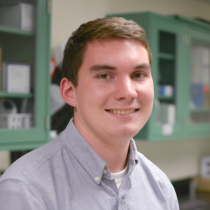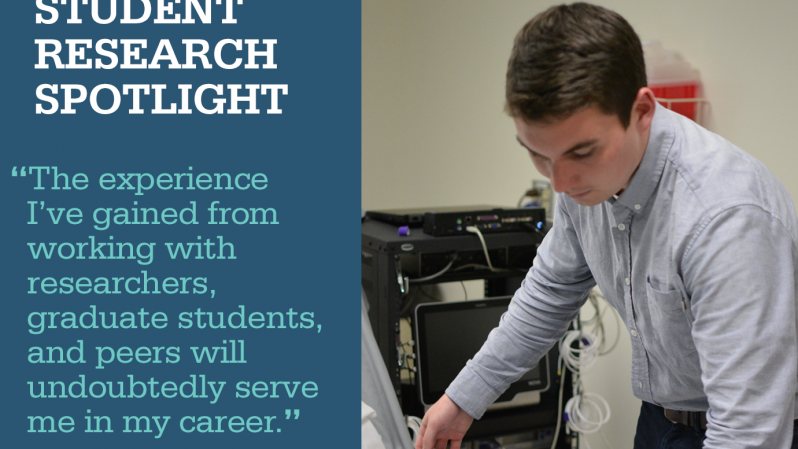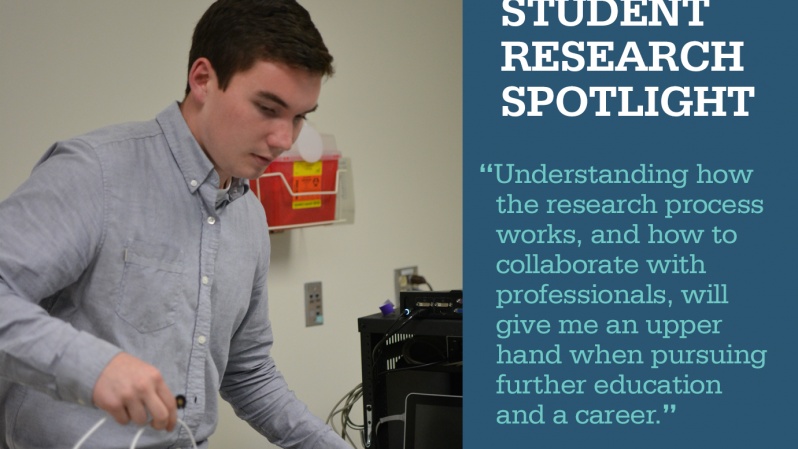Student Research Spotlight - Arthur Minahan

Arthur Minahan has always been interested in the workings of the human body. When the senior majoring in Kinesiology found out about the opportunity to participate in an innovative research project investigating potential additional benefits of a popular pain management gel, he jumped at the chance to participate.
Last summer, Minahan started working directly with Associate Professor of Kinesiology Lacy Alexander to further examine the effects of a commercially available, FDA-approved menthol-based gel called Biofreeze. The research project sought to determine if the gel not only reduces pain at the site of its application, but also at other parts of the body through dermatomes.
Dermatomes refer to areas of skin that have common innervation—or a nerve—from a single spinal root.
“Building upon the knowledge that menthol gel relieves pain and increases skin blood flow, we were interested in examining if the induced effects carried over throughout a dermatome,” Minahan said.
In other words, the investigators sought to determine if menthol gel applied directly to one area of the body also helped increase blood flow to other areas of the body which are “connected” via nerves.
To do so, the investigators measured skin blood flow and sensory nerve thresholds at a Biofreeze treatment site and at a control site within the same dermatome on the contralateral—or opposite—leg.
Their findings contribute to understanding dermatomes work and how reflexes to certain stimuli are carried out, according to Minahan.
Given these results, the next step would be to conduct the same experiments on larger populations.
“The overarching idea is, if we are able to observe an elicited response in the contralateral (untreated) dermatome, we can deduce that the effects of the menthol gel are carried over throughout a dermatome due to a spinal root reflex,” Minahan said.
The clinical implication of this would essentially be that clinicians could "treat" an area without directly touching it.
For example, if a patient that recently had knee surgery was seeking pain relief, it would be problematic to directly apply a menthol analgesic due to the sutures and the overall sensitivity of the area, Minahan explained.
“But, if we found that the desired effects of Biofreeze could carry over throughout the dermatome, it could be applied on the contralateral knee or anywhere in that same dermatome and potentially treat the site of surgery,” he said.
“The general idea is centered around the ability to treat and manage pain without directly intervening at the site of pain,” Minahan continued. “If a site or source of pain is inaccessible for any reason, this type of research could potentially provide a basis for treating such inaccessible pain.”
Minahan’s role in the project, conducted at Noll Laboratory on the University Park campus, provided him a wide understanding of the day-to-day and behind-the-scenes work involved in research, as well as the scientific process.
“Understanding how the research process works, and how to collaborate with professionals, will give me an upper hand when pursuing further education and a career,” Minahan said.
He also said everyone involved in the project, as well as others working in the lab, were supportive of him, answered questions, and provided guidance when needed. He was able to get direct experience with many aspects of a research program, too.
“I got to take part in subject recruitment, protocol design, using laser doppler flowmetry to measure skin blood flow, and using a neurometer to measure sensory perception thresholds in the subjects,” Minahan said.
In addition to boosting his knowledge for potential careers in the field, the research experience has also helped Minahan in hiskinesiology classes, as many of the topics he studied in the lab are also part of the class curriculum, such as blood flow and skin response, and how they are affected by pain and inflammation.
“Gaining additional knowledge on some of these topics through the research project has really allowed me to hone in on some of my interests in the classroom,” he said.
Minahan’s ability to be involved in the research project was made possible by the Smith Endowment in the College of Health and Human Development which supports undergraduate student research opportunities.
“I have had the opportunity to work with some incredibly intelligent people at Noll Laboratory,” Minahan stated. "The experience I have gained from working with the researchers, graduate students, and other undergraduate students will undoubtedly serve me in my career."


